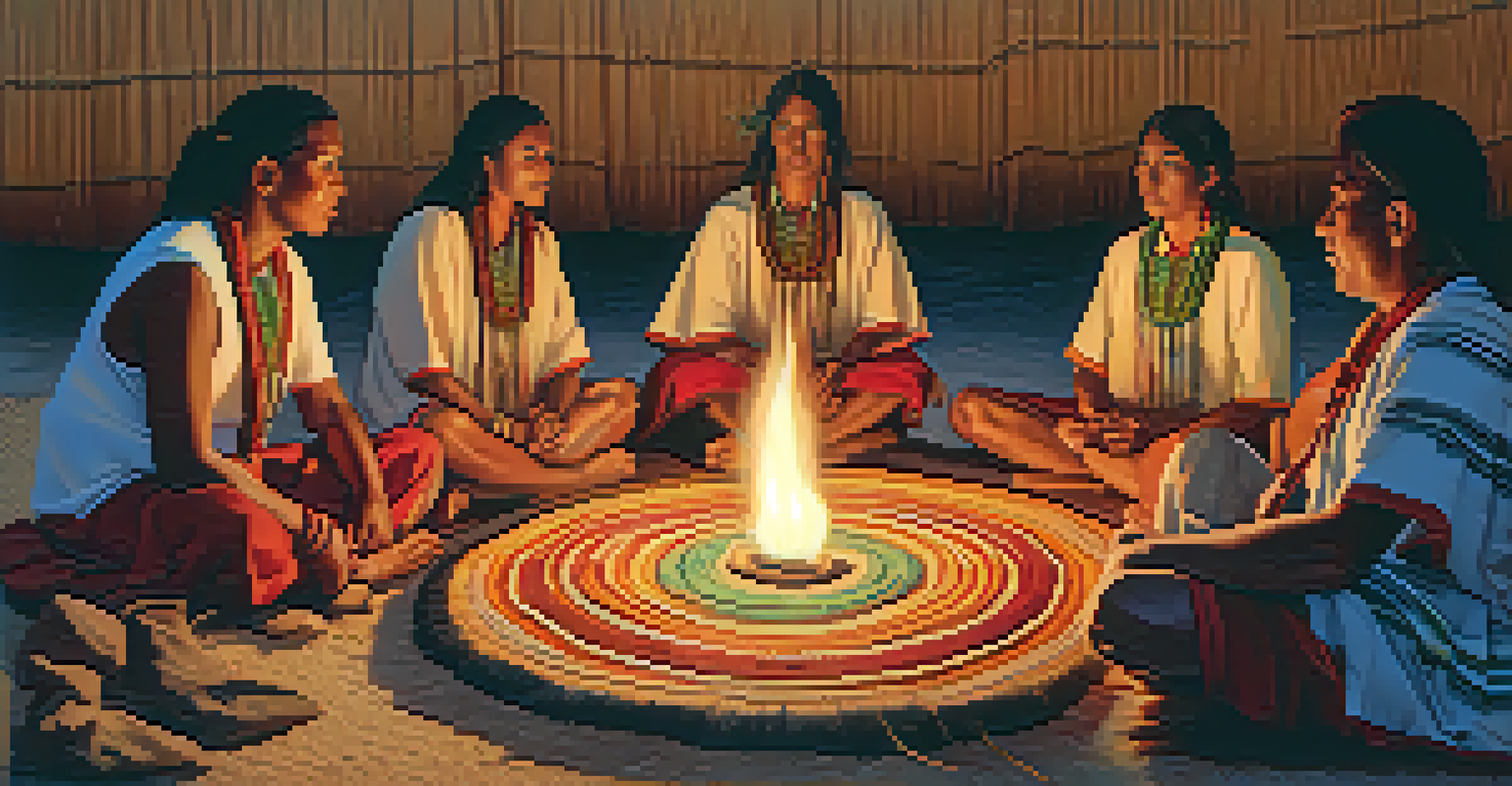The Role of Peyote in Indigenous Identity and Belonging

Understanding Peyote: A Sacred Plant in Indigenous Traditions
Peyote, a small cactus native to North America, holds profound spiritual significance for many Indigenous communities. Used in traditional ceremonies, this plant is revered for its psychoactive properties, which facilitate deep introspection and connection to the spiritual world. For many tribes, such as the Huichol in Mexico and various Native American groups, Peyote is not just a plant; it is a teacher and a guide.
The use of Peyote is not merely a practice; it is a spiritual journey that connects individuals to their heritage, identity, and the natural world.
The use of Peyote is deeply intertwined with the identity of these communities, serving as a symbol of their cultural heritage and resilience. It’s essential to recognize that the relationship with Peyote goes beyond mere ritual; it embodies a way of life that honors ancestral wisdom and communal values. Those who partake in Peyote ceremonies often describe profound experiences that reinforce their sense of belonging and identity.
Moreover, the rituals surrounding Peyote consumption are steeped in tradition, passed down through generations. These practices create a sense of continuity and community among participants, fostering a collective identity that transcends individual experiences. In essence, Peyote is more than just a plant; it is a cultural cornerstone that strengthens ties within Indigenous communities.
The Role of Peyote in Rituals and Spiritual Practices
Rituals involving Peyote are not merely about the consumption of the cactus; they are deeply symbolic events that reinforce cultural identity. During these ceremonies, participants often engage in singing, drumming, and storytelling, which serve to connect them with their heritage and each other. This communal aspect fosters a deeper sense of belonging, as individuals come together to share their experiences and insights.

The spiritual practices surrounding Peyote emphasize the importance of connection—to oneself, to others, and to the natural world. Many Indigenous peoples believe that Peyote facilitates communication with the spirit world, providing guidance and healing. As participants journey through their experiences, they often emerge with renewed perspectives on their lives and their community's role in the world.
Peyote as Cultural Identity Symbol
Peyote serves as a profound symbol of identity, connecting Indigenous peoples to their heritage, ancestors, and spiritual practices.
Furthermore, these ceremonies are often conducted in a sacred space, reinforcing the idea that the act of coming together is a spiritual undertaking. This environment encourages reflection and growth, allowing individuals to explore their identities within the context of their culture. Thus, Peyote rituals play a crucial role in shaping not only personal identities but also the collective identity of Indigenous communities.
Cultural Resilience Through Peyote Practices
The history of Peyote use among Indigenous peoples is one of resilience and adaptation. Despite facing numerous challenges, including colonization and cultural suppression, many communities have maintained their traditional practices surrounding Peyote. These rituals serve as a form of resistance, a way to preserve cultural identity in the face of adversity.
Peyote is a bridge to our ancestors, allowing us to explore our identities in a culturally meaningful context.
In recent years, there has been a resurgence of interest in Peyote ceremonies, particularly among younger generations seeking to reconnect with their roots. This revival is crucial for the survival of Indigenous cultures, as it empowers individuals to embrace their heritage and affirm their identities. The act of participating in these practices is a powerful statement of belonging and cultural pride.
Moreover, the growing recognition of Peyote's cultural significance has sparked dialogues about Indigenous rights and sovereignty. As communities advocate for the protection of their traditional practices, Peyote stands as a symbol of cultural resilience. This ongoing struggle for recognition and respect underscores the importance of Peyote in shaping not only individual identities but also the broader narrative of Indigenous existence.
Peyote and Its Connection to Indigenous Identity
For many Indigenous peoples, Peyote is a profound symbol of identity that embodies their connection to the land, ancestors, and spirituality. The act of consuming Peyote is often seen as a bridge to their heritage, allowing individuals to explore their identities in a culturally meaningful context. This connection enhances their understanding of who they are and where they come from.
The narratives surrounding Peyote also highlight the importance of storytelling in Indigenous cultures. Through the sharing of stories during Peyote ceremonies, participants pass down teachings and values that shape their collective identity. These stories not only honor the past but also inspire future generations to embrace their cultural heritage.
Rituals Foster Community Connection
Peyote ceremonies reinforce cultural identity through communal rituals that encourage reflection, storytelling, and a sense of belonging.
In this way, Peyote becomes a vehicle for self-discovery and cultural affirmation. It allows individuals to navigate their identities in a world that often marginalizes Indigenous perspectives. By reaffirming their connection to Peyote, these communities reclaim their narratives and assert their place in the broader cultural landscape.
Challenges and Controversies Surrounding Peyote Use
While Peyote plays a significant role in Indigenous identity, it is not without its challenges and controversies. Legal restrictions on Peyote use can hinder access for those who wish to partake in traditional ceremonies. This has led to ongoing debates about Indigenous rights and the importance of protecting sacred practices from external interference.
Additionally, the growing interest in Peyote among non-Indigenous individuals raises concerns about cultural appropriation. The commodification of Peyote threatens the sacredness of its use and can dilute its cultural significance. Many Indigenous leaders advocate for the protection of Peyote as a cultural resource, emphasizing that it should be reserved for those who hold it sacred.
These challenges highlight the need for respectful dialogue and understanding of Indigenous practices. As more people become aware of the significance of Peyote, it's crucial to approach the topic with sensitivity and respect for its cultural roots. Upholding the integrity of Peyote practices is essential for preserving Indigenous identity and ensuring that future generations can continue to benefit from its teachings.
Peyote's Role in Modern Indigenous Movements
In contemporary society, Peyote has emerged as a symbol of cultural pride and activism within Indigenous movements. As Indigenous peoples advocate for their rights and recognition, Peyote serves as a powerful reminder of their heritage and the importance of traditional practices. This has fostered a renewed sense of unity among communities working towards common goals.
Participating in Peyote ceremonies can empower individuals to engage in activism rooted in their cultural values. Many see these rituals as a means to strengthen their resolve in advocating for social, environmental, and political justice. By honoring their traditions, they can better articulate their needs and aspirations within broader societal contexts.
Challenges to Peyote Practices
Legal restrictions and cultural appropriation pose significant challenges to the traditional use of Peyote, highlighting the need for respectful dialogue and advocacy.
Moreover, the integration of Peyote into modern movements highlights the resilience of Indigenous cultures. It demonstrates the ability to adapt traditional practices to address contemporary challenges while maintaining a connection to the past. Through Peyote, Indigenous communities continue to assert their identities and work towards a future that honors their rich cultural heritage.
Conclusion: The Enduring Legacy of Peyote in Indigenous Identity
The significance of Peyote in Indigenous identity and belonging cannot be overstated. As a spiritual guide, cultural symbol, and source of community connection, Peyote embodies the essence of many Indigenous traditions. Its use in rituals and ceremonies fosters a deep sense of belonging and cultural pride, reinforcing the importance of heritage in an ever-changing world.
As challenges arise, the resilience of Indigenous communities shines through their commitment to preserving their cultural practices. The ongoing dialogue surrounding Peyote underscores the need for respect, understanding, and advocacy for Indigenous rights. By recognizing and honoring the role of Peyote, we can contribute to a more inclusive narrative that values Indigenous perspectives.

Ultimately, Peyote represents more than just a plant; it signifies the enduring legacy of Indigenous peoples and their unwavering connection to their identities. Through continued engagement with Peyote traditions, future generations will carry forward the teachings and values that shape their cultures, ensuring that the spirit of belonging remains alive for years to come.